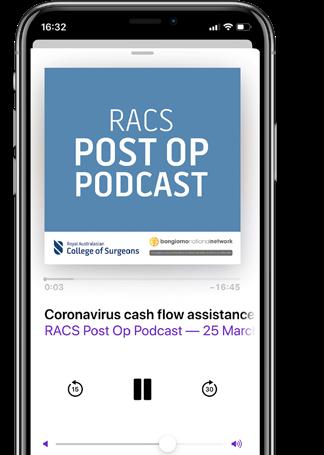
3 minute read
Vice president’s perspective
It’s great to see some sunshine and the good news is that as winter goes we also see a decrease in COVID-19 cases in Australia and Aotearoa New Zealand with both governments dropping daily updates on COVID-19 case numbers to weekly reporting on new infections. While the pandemic is by no means over and remaining vigilant is critical, I am optimistic about the future. Having said this, it will take us a long time to get back to normalcy. Hospitals are busy managing postponed procedures to ease pressure on the heath system. It is important to allow as many surgeries as possible to go ahead as we have many patients who are really suffering. It is good to see Victoria taking steps to transform private hospitals such as Frankston and Bellbird for public surgery. This will boost surgical services for our communities and provide more options for patients awaiting surgery. More recently, we signed a memorandum of understanding with the Northern Territory to enable surgical Trainees to continue their training in the Territory and not have to move to other states in Australia. As part of this program, we will advocate for increasing the number of training positions so we can have more people based there. We anticipate the first intake of Trainees will begin in 2025. We are committed to assisting the Northern Territory with workforce issues and improving access to surgical services and training. We know that if surgeons are local and are trained locally, they’re much more likely to stay in a rural setting. We hope programs like these will improve access to rural surgery. Congratulations to the RACS Rural Health Equity team, Councillors such as Professor Kerin Fielding, the Northern Territory government and partners such as the Charles Darwin University and Flinders University for their hard work and commitment in making this important initiative a reality.
We’ve also made some good in-roads in our global health work. The RACS Global Health team and three Fellows attended the Pacific Directors of Clinical Services (DCS) Meeting in Nadi, Fiji in late August and presented on RACS Global Health Pacific Islands Program achievements. This was an opportunity to connect with senior clinical leaders across the Pacific.
Advertisement
In early September, the team attended the Pacific Heads of Nursing (PHON) meeting. They presented to nurse leaders on what the RACS Pacific Islands Program (PIP) had achieved in building perioperative nursing capacity in partnership with the Pacific Community, an international development organisation governed by 27 members, including Pacific island countries and territories, and the Pacific Islands Operating Room Nursing Association (PIORNA). While in Fiji, the team took the opportunity to conduct partner reflection workshops with the Pacific Community, Fiji National University, DCS and PHON.
The team also met with DFAT to continue contract discussions for the next phase of the RACS PIP. This issue of Surgical News, we focus on wellbeing. The wellbeing of our people whether staff, Fellows, Trainees and Specialist International Medical Graduates (SIMGs) is important. The RACS Wellbeing Working Group has been tasked with reviewing existing support options for surgeons and has produced a report and a Wellbeing Action Plan to be considered by the RACS Council in October. The Action Plan addresses gaps and new opportunities to advance wellbeing for Trainees, Specialist International Medical Graduates and Fellows.
The report also recommends RACS involvement in a collaborative research project on doctors’ health and wellness to establish the current state of wellbeing for all specialist doctors. It also includes the establishment of an Intercollege Wellbeing Working Group to oversee implementation of the Wellbeing Action Plan. I end by acknowledging the 25th year anniversary of the founding of the Australian Indigenous Doctors Association (AIDA). It is a timely reminder of the work yet to be done to embed our tenth competency (cultural competence and cultural safety) in both countries, and within our daily life—training, continuing professional development and our workplaces.
Professor Chris Pyke Vice president
RACS Post Op podcasts
Listen to interviews with some of the most inspiring and forward-thinking industry professionals. Developed by RACS, the Post Op Podcasts feature extended interviews on the latest research across the medical industry, as well as practical advice that surgeons can implement in their practices, such as insights on financial management, wealth creation, legal and tax advice and economic forecasts. You can subscribe to the fortnightly RACS Post Op Podcasts on Apple’s iTunes or on Stitcher if you have another smartphone model.
Listen on iTunes
Search ‘RACS Post Op’ in the Podcast app on iPhone or in iTunes on desktop
Listen on Stitcher
Search ‘RACS Post Op Podcast’ on stitcher.com











